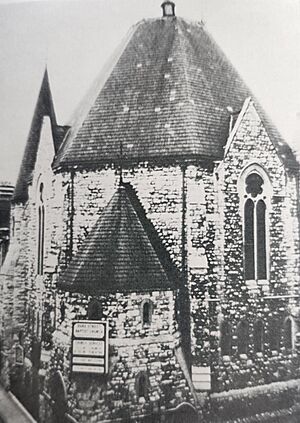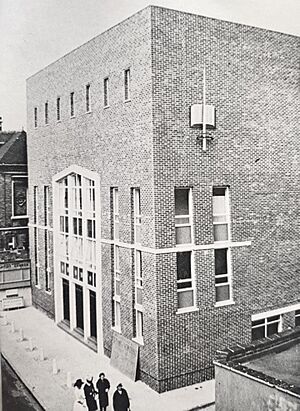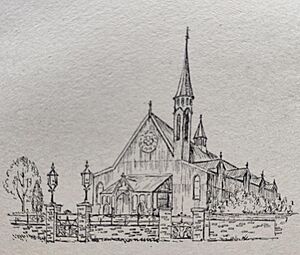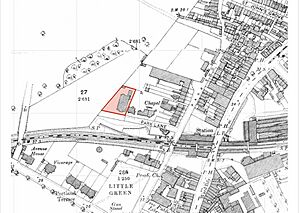Duke Street Church, Richmond facts for kids
Quick facts for kids Duke Street Church |
|
|---|---|
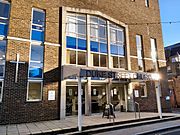
The front of the church building in 2018
|
|
| Location | Duke Street, Richmond TW9 1DH |
| Country | England, United Kingdom |
| Denomination | Conservative Evangelicalism |
| Website | www.dukestreetchurch.com |
| History | |
| Founded | 1870 |
| Founder(s) | Frederick Brotherton Meyer |
| Architecture | |
| Years built | 1962 |
Duke Street Church is a Christian church located on Duke Street in Richmond, South West London. It follows a conservative evangelical style of Christianity. This means it focuses on the Bible's teachings and has a history linked to the Baptist tradition. The church is part of groups like the Fellowship of Independent Evangelical Churches (FIEC) and the Evangelical Alliance.
Contents
History of Duke Street Church
How the Church Started
The church began in 1868 thanks to a student pastor named Frederick Brotherton Meyer. In 1869, he asked Charles Spurgeon, a well-known Baptist leader, for help. Meyer wanted to create a lasting church in the area.
The church officially started in 1870 with 47 members. It was first called Parkshot Church and met in a temporary iron building. This building was located near Park Lane.
Moving to Duke Street
The church wanted to be closer to the town centre. So, in 1878, the original Parkshot Church building was sold. The new owners then started Christ Church, Richmond. The spot where Parkshot Church once stood is now The Gateways building.
In 1881, the first Duke Street building was finished. It was shaped like an octagon and built from stone in an early French Gothic style. It was known as Duke Street Baptist Chapel. At first, the church struggled, but by 1946, it had grown too big. Sunday evening services even had to move to Richmond Theatre.
New Buildings and Renovations
In 1950, the church bought a nearby dance hall called Princes Hall. Then, in 1962, Sir Cyril Black opened the current church building. This new building was called Duke Street Baptist Church and had a large hall that could seat over 600 people.
In the early 2000s, the church changed its name again to the current Duke Street Church. Since then, more work has been done. A cafe, meeting rooms, and offices were added in 2010. The main hall was also greatly improved in 2022.
Other Early Baptist Groups in Richmond
Some records suggest that Duke Street Church was the first Baptist church in Richmond. However, there is evidence of a Baptist church existing in Richmond between 1715 and 1730. This earlier church was led by Thomas Flood.
By the 1850s, another Baptist group had formed. This was a Strict Baptist group called Rehoboth Chapel on Kew Foot Road.
Salem Baptist Chapel
In 1861, a disagreement at Rehoboth Chapel caused some members to leave. Thirteen members started a new church called Salem Baptist Chapel in Richmond. They first met in rooms on Church Walk.
From 1863 to 1887, Salem Baptist Chapel met in a building now known as the Dome Building. This building had many names over the years, including the Mechanics Institute and the Royal Assembly Rooms. In 1888, Salem Baptist Chapel moved to Parkshot Road. It later moved to Kew in 1973, becoming Kew Baptist Church, before closing in 2021.
Senior Ministers of Duke Street Church
The Senior Minister is the main leader of the church. Here is a list of the people who have served as Senior Ministers at Duke Street Church over the years.
| From | To | Name | From | To | Name |
|---|---|---|---|---|---|
| 1868 | 1869 | Fredrick B Meyer, as student pastor | 1926 | 1939 | Fred W. Walter |
| 1870 | 1872 | Robert J Colman (resigned) | 1940 | 1953 | Alan Redpath |
| 1873 | 1875 | John Whittaker (resigned) | 1953 | 1959 | Stephen F. Olford |
| 1875 | 1884 | John Hunt Cooke | 1959 | 1978 | John L. Bird |
| 1885 | 1890 | James J. Ellis (resigned) | 1978 | 1986 | REV. DR. WILLIAM (BILL) FREEL |
| 1891 | 1891 | interim – James Tillett | 1982 | 1986 | interim – George Beasely-Murray |
| 1892 | 1898 | Ernest Matthews (resigned) | 1986 | 1999 | Robert G.M. Amess |
| 1899 | 1921 | Horace Warde | 2000 | 2012 | Liam Goligher |
| 1922 | 1926 | E. B. Greening | 2013 | 2023 | John L. Samuel |
Sir Eric Richardson
Sir Eric Richardson (who passed away in 2006) was a dedicated member and leader (deacon) at Duke Street Church for many years. He was recognized for his important work in higher education. He led three institutions that later became universities. Sir Eric was also a significant leader in evangelical Christianity during the 20th century.
External links
- Official website: https://www.dukestreetchurch.com
- South East Gospel Partnership
 | Jackie Robinson |
 | Jack Johnson |
 | Althea Gibson |
 | Arthur Ashe |
 | Muhammad Ali |


